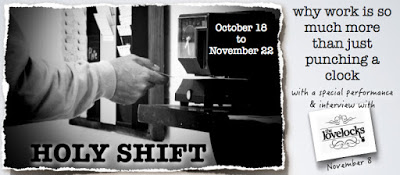If we’re honest, we’ll all admit that we’ve complained about work from time to time. Some of us love work, some of us hate work, and the rest of us put up with work. We all wish that we could have a job that we absolutely love, but that’s not always the case.
I once heard that if you’re in a rough patch at work there’s one easy way to help you get through it. Walk into a pharmacy, purchase a Johnson & Johnson thermometer. Not just any kind, but a ‘rectal’ thermometer (that’s right, I just said that). Open the box and read through the literature. In fine print you’ll see, “This product has been personally test and sanitized”. This will put to rest your complaining. You will say with confidence, “I am so thankful for my job”. End of story!
In Genesis 2:15, we read this, “The Lord took the man and put him in the garden, to work it and take care of it.” After God does his work, he gives Adam a job to do, ‘oversee my creation’. God says, ‘I made this garden, you can take care of this garden, and you can eat from this garden.’ God essentially does the same for us. How? He gives us a similar job – take care of the space I’ve given you to live in. We should start, if we haven’t yet, to see our jobs in that light. What will help us take ownership of our responsibility is narrowing things down to essentials – if I want to eat then I must work.
The Scriptures most common understanding of work is that we make a living by it. Just read these verses and see what we mean:
tills the land will have plenty of bread, but one who follows worthless
pursuits will have plenty of poverty” (Proverbs 28:10)
Paul says…‘If you don’t
work, you won’t eat’ (2 Thess 3:10)
filled, but the desires of the diligent are fully satisfied. (Proverbs 13:4)
so at harvest time they look but find nothing. (Proverbs 20:4)
Do not love
sleep or you will grow poor; stay awake and you will have food to spare. (Proverbs 20:13)
what you’re told by your earthly masters. And don’t just do the minimum that
will get you by. Do your best. Work from the heart for your real Master, for
God, confident that you’ll get paid in full when you come into your
inheritance. Keep in mind always that the ultimate Master you’re serving is
Christ. The sullen servant who does shoddy work will be held responsible. Being
a follower of Jesus doesn’t cover up bad work.” (The Message)
– – – – – – – – – – – – – – – – – – – – – – – – – – – –
Small(er) Groups Discussion Questions:
What are your first impressions? What resonated with you? What caused you to question?
What do you think of Genesis 2:15? Adam’s first job to work the garden & take care of it? How does that apply to us? And do you feel God invites us to do the same by calling us to work in the space he’s given us to live in?
Is there anything spiritual about making a living? I mean, is it just a given or is there something honourable in providing, for yourself and/or your family?
What do we learn from some of the verses in proverbs? Pick one or all of them to discuss. You might want to read through Proverbs 6:6-11 as well.
How can working well, working with excellence be a reflection of your faith? Do you think it even matters? What do you get from Colossians 3 (above); regarding our calling to live differently, to a higher standard perhaps?
Take some time to pray…
– for your work places
– for your skills and passions
– for those who don’t have work
– for a heart that is grateful for God’s provision

